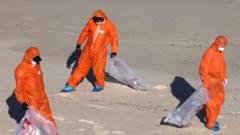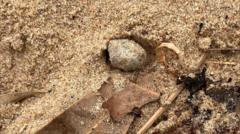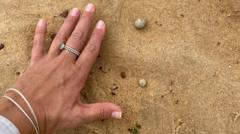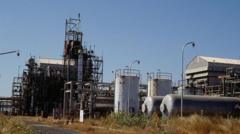Officials continue to investigate the source of the black tar-like substances found on the shores.
Beaches in Sydney Reopen After Mystery Tar Balls Cleaned Up

Beaches in Sydney Reopen After Mystery Tar Balls Cleaned Up
Health concerns prompted closures, but now swimmers are welcome again.
Sydney has reopened its famous beaches, including Bondi, for swimmers after a temporary closure due to mysterious black tar-like balls that washed ashore earlier this week. Thousands of these deposits raised health alarms, prompting immediate clean-up efforts across eight beaches. The New South Wales Environment Minister, Penny Sharpe, confirmed that testing revealed the balls were made from fatty acids and chemicals similar to those found in cosmetics and cleaning products. However, the origin of the tar balls remains unclear.
Investigations led by the New South Wales Maritime Authority are ongoing to pinpoint the source and responsible parties behind this pollution incident. The authority also noted that while the tar balls are not highly toxic to humans, touching or picking them up is not advisable. Maritime Executive Director Mark Hutchings emphasized that the balls pose minimal danger when left undisturbed on the beach, but beachgoers should report any sightings to lifeguards immediately.
Moreover, the New South Wales Environment Protection Authority (EPA) is conducting further laboratory tests to unravel the mystery surrounding the origin of the substances. "It is still somewhat of a mystery and may take a few more days to determine origin," said EPA Executive Director Stephen Beaman. In the event that individuals come into contact with the balls, they are advised to wash their hands with soap and water or baby oil. The beaches, now declared safe for public enjoyment, have welcomed back swimmers relieved to return to their beloved aquatic playgrounds.
Investigations led by the New South Wales Maritime Authority are ongoing to pinpoint the source and responsible parties behind this pollution incident. The authority also noted that while the tar balls are not highly toxic to humans, touching or picking them up is not advisable. Maritime Executive Director Mark Hutchings emphasized that the balls pose minimal danger when left undisturbed on the beach, but beachgoers should report any sightings to lifeguards immediately.
Moreover, the New South Wales Environment Protection Authority (EPA) is conducting further laboratory tests to unravel the mystery surrounding the origin of the substances. "It is still somewhat of a mystery and may take a few more days to determine origin," said EPA Executive Director Stephen Beaman. In the event that individuals come into contact with the balls, they are advised to wash their hands with soap and water or baby oil. The beaches, now declared safe for public enjoyment, have welcomed back swimmers relieved to return to their beloved aquatic playgrounds.




















